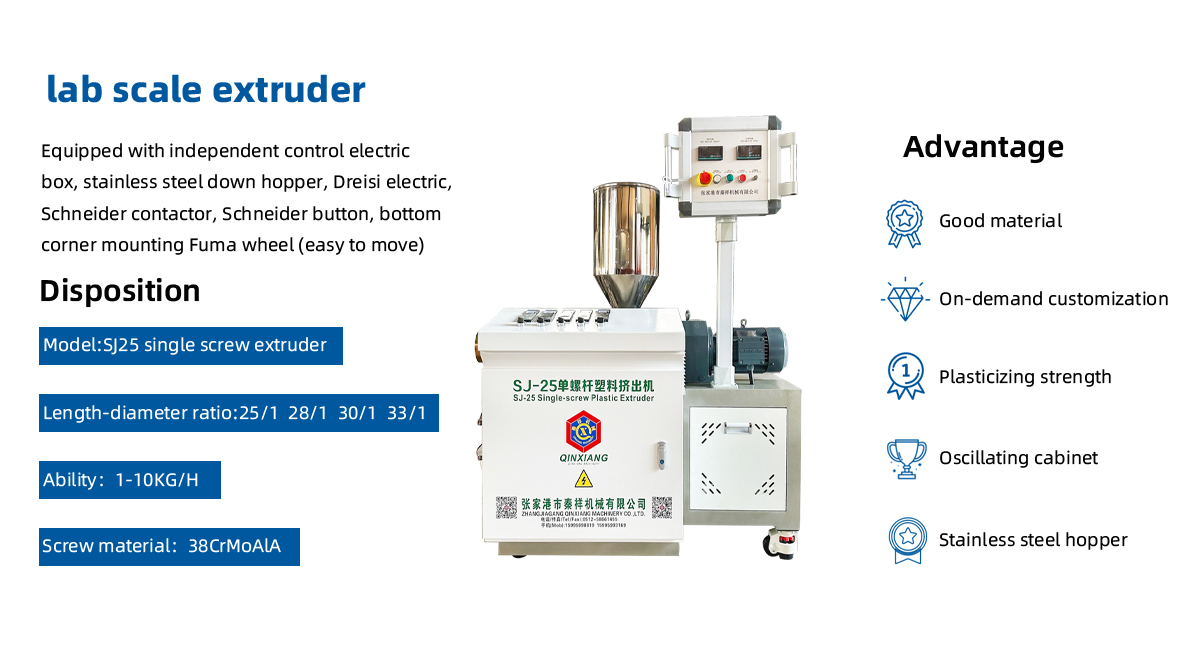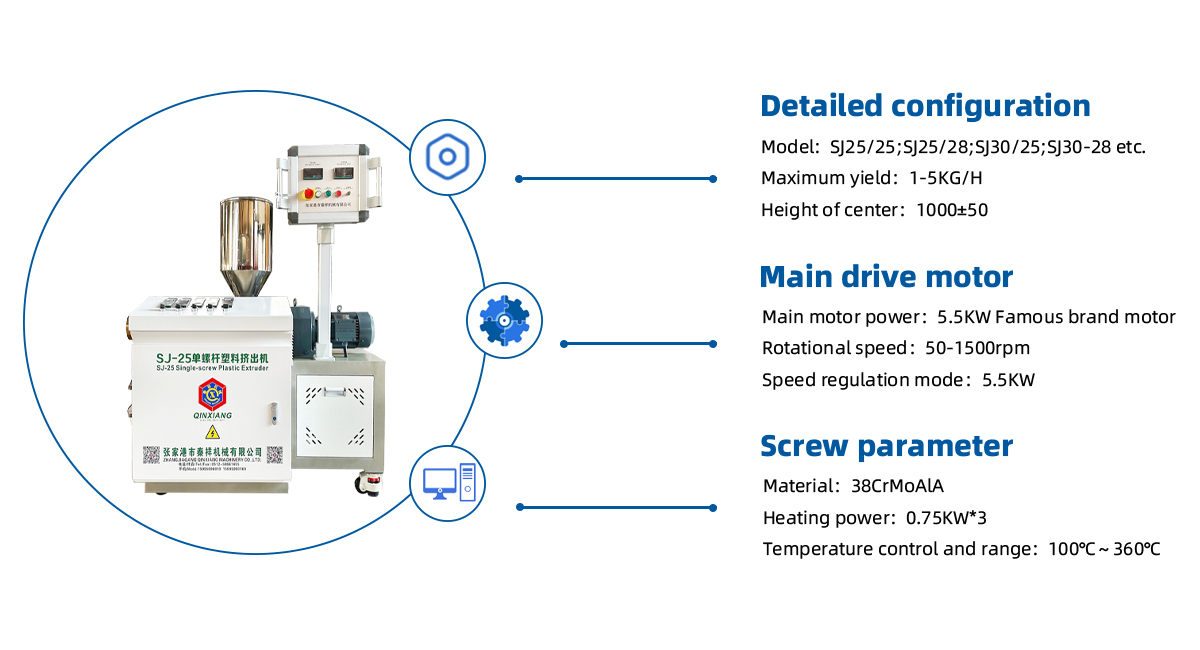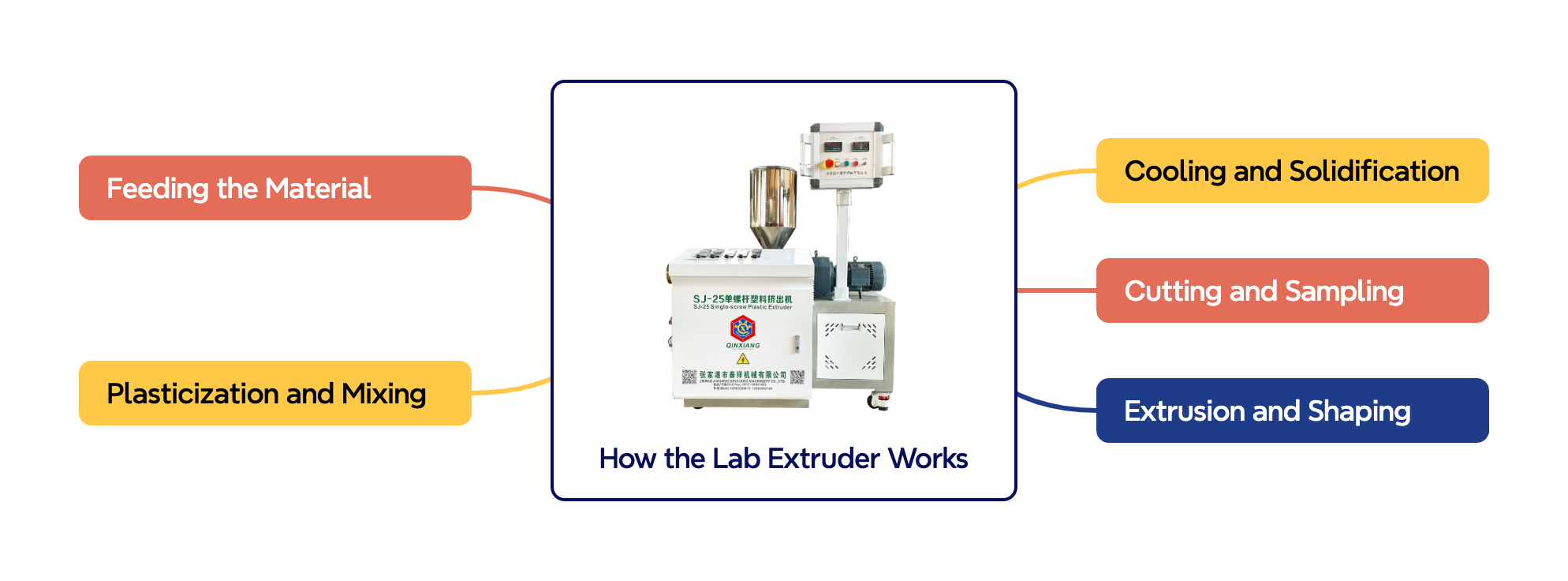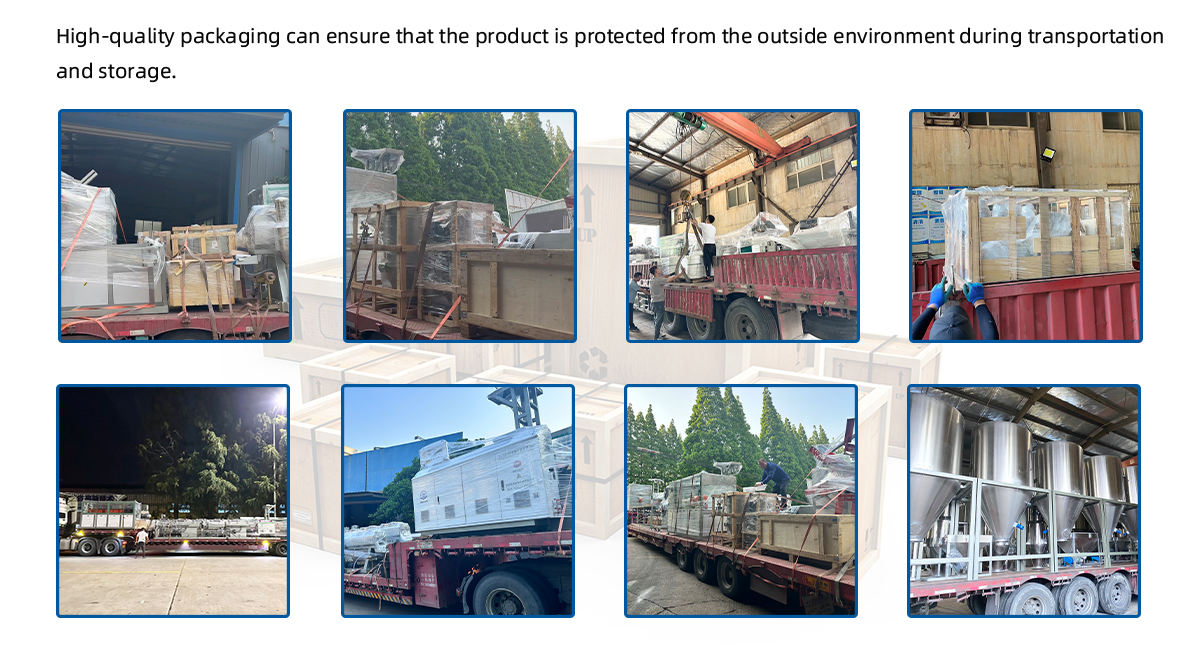▏Product Vedio
▏Lab Extruder
▏Introduction to the Lab Extruder
A lab extruder is a specialized piece of equipment designed for small-scale plastic extrusion processes, making it an essential tool in research and development (R&D) environments. It is primarily used to create plastic materials and test new formulations on a small scale before moving to full production. Whether used in academic labs, industrial R&D centers, or small production settings, the lab extruder provides an efficient, cost-effective way to process a variety of thermoplastics, including PVC, PE, PP, PET, and more.
The compact and versatile nature of lab extruders makes them ideal for producing small quantities of extruded materials like pipes, profiles, sheets, films, and other polymer-based components. These machines allow researchers and manufacturers to fine-tune extrusion parameters such as temperature, pressure, and screw speed to optimize material properties, making them an indispensable part of plastic material testing and prototyping.
▏Key Features of the Lab Extruder

 | Precision Control for Material Testin |
| One of the defining characteristics of a lab extruder is its precise control over the extrusion process. The machine features multiple adjustable parameters, including temperature, screw speed, and pressure, allowing researchers to fine-tune the extrusion process and produce consistent results. This level of precision is essential for testing different materials, creating prototypes, and ensuring that the final product meets specific performance requirements.
The extruder is typically equipped with advanced digital controllers, which ensure that each extrusion run is reproducible, providing reliable data for material research and product development. The screw design is also critical to the machine's performance, ensuring that the polymer is adequately mixed and heated for optimal processing. |
 | Versatility in Material Processing |
|
The lab extruder is designed to handle a wide variety of thermoplastic materials, making it a versatile solution for researchers and manufacturers working with different polymers. Common materials processed in lab extruders include PVC, PE, PP, PS, PET, and more. This versatility allows users to experiment with various polymer blends, additives, and fillers to develop custom formulations for specific applications.
Additionally, the lab extruder can accommodate a range of feed forms, including pellets, powders, and regrind material. This flexibility enables users to conduct experiments with different types of feedstock, providing insights into how the material's processing conditions affect its properties. |
 | Customizable Die Options for Various Profiles |
|
The lab extruder can be equipped with different die heads to produce various profiles, including simple round tubes, films, sheets, or even more complex shapes such as custom profiles for testing. This customization capability is invaluable when conducting R&D for different plastic products or creating samples for testing purposes.
By changing dies, researchers can quickly switch between different profiles to test a range of products, all while using the same extruder. This saves both time and money in comparison to purchasing separate machines for each type of profile. |
 | Compact and User-Friendly Design |
|
Designed for lab and small-scale production environments, the lab extruder is typically compact, taking up minimal space while providing all the capabilities of a larger, industrial extruder. Its small size makes it suitable for use in laboratories, where space is often limited, without compromising on performance.
Despite its compact nature, the lab extruder is highly efficient and capable of handling various material forms and processing requirements. Its user-friendly design allows operators, even those with limited experience, to set up and adjust parameters quickly and easily, enabling fast experimentation and results. |
 | Advanced Temperature and Cooling Control |
|
The lab extruder is equipped with advanced temperature control systems to ensure that the polymer is heated to the right processing temperature. Multiple heating zones along the barrel and die provide the precise temperature control needed to maintain the material’s optimal processing conditions.
An integrated cooling system, often in the form of air cooling or water baths, is used to rapidly cool the extruded material once it exits the die. This rapid cooling ensures that the extruded product solidifies quickly, retaining its desired shape and dimensional accuracy. |
▏Main Details

▏Product Photos
▏How the Lab Extruder Works

 | Feeding the Material |
| The extrusion process begins with the feeding of raw material into the hopper, where it is delivered to the barrel. The material can be in pellet form, powder, or regrind, depending on the requirements of the specific application. The extruder's feeding system is designed to ensure consistent delivery of the material into the barrel, minimizing the risk of blockages or irregular flow. |
 | Plasticization and Mixing |
| Once inside the barrel, the material is heated and mixed by the rotating screw. The screw's design plays a key role in ensuring that the material is adequately plasticized and blended, creating a uniform melt. The screw speed, which is adjustable, helps control the melt flow and ensures that the material reaches the correct viscosity for extrusion.
Temperature sensors along the barrel ensure that the polymer reaches its ideal processing temperature. Precise temperature control ensures that the material is processed without degradation, which could affect the physical properties of the extruded product. |
 | Extrusion and Shaping |
|
As the molten polymer moves through the barrel, it is forced through the die, which shapes it into the desired profile. The lab extruder is typically equipped with interchangeable dies, enabling users to produce various profiles such as pipes, films, or sheets. The die design determines the final shape of the extruded material, and the die temperature is carefully regulated to maintain consistency and prevent defects.
Extrusion speed is adjustable, allowing the operator to control the output and ensure uniformity in the final product. The pressure in the barrel can also be adjusted to match the specific material being processed, ensuring optimal melt flow and extrusion quality. |
 | Cooling and Solidification |
|
Once the extruded material exits the die, it is cooled using either a water bath or air cooling system. The cooling system ensures that the material solidifies into its final shape quickly, preventing deformation or dimensional instability.
The cooling process can be adjusted depending on the type of polymer being extruded. For instance, rigid materials may require faster cooling rates, while flexible materials may benefit from slower cooling to avoid internal stress. The ability to control the cooling rate is critical for achieving the desired mechanical properties in the final product. |
 | Cutting and Sampling |
|
After cooling, the extruded material is cut into the required length for testing, further processing, or analysis. The lab extruder typically includes a cutting system that allows for accurate, consistent cuts, ensuring that each sample is uniform in size. This capability makes it easy to collect test samples for mechanical testing, further processing, or product evaluation. |
▏Applications of the Lab Extruder

 | Research and Development |
| The lab extruder is a crucial tool for polymer scientists and engineers engaged in R&D. It provides a controlled environment for experimenting with new polymer formulations, testing the effects of additives or fillers, and refining processing conditions. By using a lab-scale extruder, researchers can simulate large-scale production conditions without the need for expensive full-scale equipment. |
 | Material Testing |
| Laboratories use the lab extruder to test various material properties, such as melt flow rate, tensile strength, and elongation. The machine allows for precise control of extrusion parameters, providing accurate and reproducible data for assessing material performance. The lab extruder is also used to test how different formulations behave during processing, which helps ensure that the final product meets the required standards. |
 | Prototyping and Product Development |
| The lab extruder is frequently used by manufacturers to create prototypes of new plastic products. Small-scale extrusion allows for quick production of test samples, which can then be used to evaluate product performance or customer acceptance. Whether producing prototypes for the automotive, medical, or packaging industries, the lab extruder provides an efficient, cost-effective solution. |
 | Educational and Training Purposes |
| In academic settings, the lab extruder is used as a teaching tool to demonstrate the principles of polymer processing. It provides hands-on experience in extrusion technology, giving students and trainees valuable insights into the extrusion process. The lab extruder is an essential part of polymer engineering and materials science programs. |
▏Advantages of the Lab Extruder
 | Advantages of the Lab Extruder |
| 1. Compact and Efficient
The lab extruder is designed to be space-efficient, making it ideal for laboratories with limited space. Despite its small size, it offers all the functionalities required for small-scale polymer processing. 2. Highly CustomizableWith interchangeable dies and adjustable parameters such as screw speed, temperature, and pressure, the lab extruder can be customized for a wide variety of materials and extrusion profiles. 3. Precise Process ControlThe ability to precisely control extrusion parameters ensures that researchers and manufacturers can replicate conditions across multiple tests, resulting in reliable and consistent data. 4. Cost-EffectiveThe lab extruder offers a cost-effective solution for small-scale production, material testing, and prototyping, saving both time and money compared to large-scale extrusion systems.
|
▏A Vital Tool for Polymer Innovation
The lab extruder is an indispensable tool for any laboratory or small-scale production environment where plastic extrusion is required. Whether used for research, testing, prototyping, or teaching, the lab extruder provides precision, versatility, and cost-efficiency. By offering precise control over key extrusion parameters, the lab extruder enables researchers and manufacturers to develop new materials, improve existing products, and reduce risks during the early stages of production. With its compact design, versatility, and high-performance capabilities, the lab extruder is a critical asset for anyone involved in polymer science and plastic product development.
▏About Us

▏Corporate Culture

▏Cooperative Parts Supplier

▏Packing And Shipping



















































